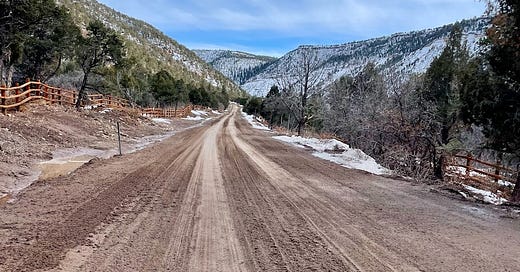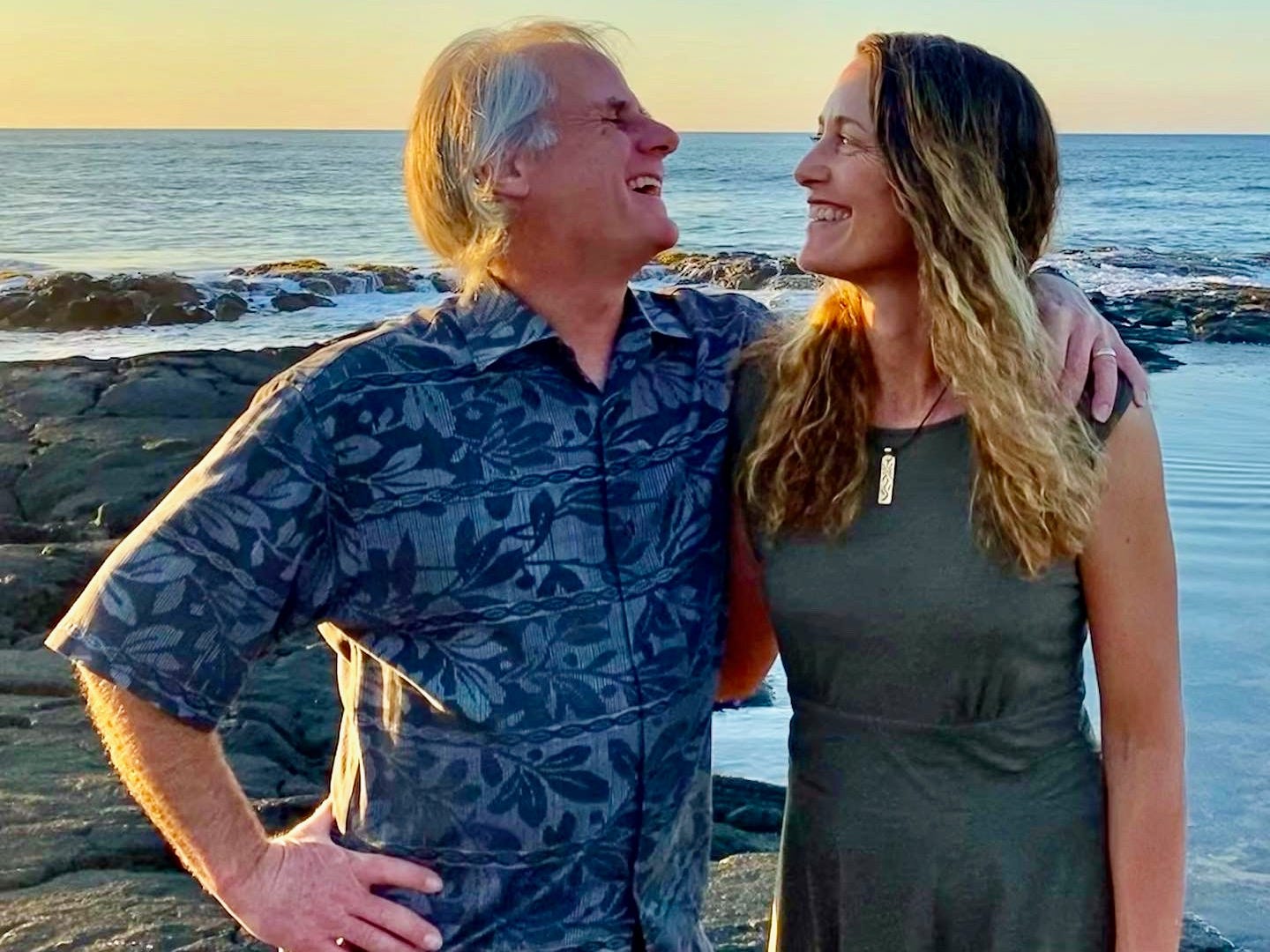Welcome back. Later today (Wednesday, February 15), I’m hosting a Zoom for paid subscribers so we can chat about a few topics and get to know each other. You can gain access to monthly online meetups and bonus posts—and receive my deep gratitude—by upgrading to a paid membership.
Teaser: Even if you don’t care about this post’s first section on racing ultras, you might want to scroll down to the final part on sex and relationships.
We’re experiencing whiplash weather here in southwest Colorado. Three days ago, I ran a melted-out backroad and relished the 40-degree temperature, which felt warm! Now, snow is dumping again.

On Friday, I fly to Phoenix to spend the weekend volunteering and then running at the Black Canyon Ultras. I’m slightly giddy with anticipation of my first race of this year, in large part because of the desert setting and T-shirt weather once the sun rises. But also, I’m stoked for the competition, both as a spectator/volunteer at Saturday’s uber-competitive 100K and as a competitor at Sunday’s 60K.
Wait, did I just call myself a competitor, even though I’ll finish midpack and barely have a shot at placing top 3 in the female 50 - 59 age group? Yes, I’m competing. Let’s think about what that means and how it affects the experience of running a race, no matter how you stack up against the others.
Say it: I’m a competitor
Like many midlife midpack runners, I’ve lapsed into running races for reasons that have less to do with competition. I toe the line for camaraderie, scenery, aid station support, and the race-day magic that enables you to go farther and a little faster than you ordinarily would on your own. Going for a podium spot or age-group win has faded in importance and now usually feels far-fetched. If I race with effort, I’m usually just racing my watch and trying to get under a certain time, not trying to beat others.
By contrast, earlier in my 28 years of running and racing, I cared about placing. Although I never got close to “elite” level, I wasn’t just racing for personal-bests, I was out to pass and finish ahead of others, sometimes landing on the podium. I entertained myself in the final miles of every race by playing “the road kill game” in my head, meaning I’d give myself a point for every runner I passed and deduct a point for anyone who passed me. I felt like Ms. Pac-Man gobbling up runners like dots for points.
I vividly recall the thrilling final mile of the 2008 Big Sur Marathon, a hilly beast of a road-marathon course with some 4000 participants, about a third of whom were female. I could spot a woman about 100 meters ahead. With someone on the sidelines yelling, “Get her!” I committed to reel her in. I had no idea where we placed in relation to other women in the race, I just knew I wanted to catch and pass her.
With less than a quarter mile to go, I closed the gap, and she realized my presence as we approached the finishing chute. We both sprinted with elbows nearly touching. I remember thinking, not today—meaning, I’ve been passed in the final kick before, but it won’t happen today—and I dug as deep into my well of energy and desire as I could. I passed her right before we crossed the line and, one month shy of my 39th birthday, I beat her by one second to win our 30 - 39 age group medal and place 4th female overall in 3:21, a time I’m proud of given the route’s hill profile.
I was utterly spent, about to vomit from exertion, but I felt fan-fucking-tastic!
Those moments of superwoman effort to catch and pass others in a race became increasingly rare over the past five years. I generally don’t flip a switch mentally to race until the final phase of an event, based on how I’m feeling. I’ll be “chill” for the first half of the race or longer (which generally is a good strategy for ultras), then decide whether I care about my time or about trying to catch others up ahead. I’m less goal-oriented about racing, more inclined to think of the race as the central part of a fun daytrip.

Last Saturday, however, I listened to this Singletrack podcast, and it got my competitive juices flowing in a good way and rekindled my relationship to ultrarunning as a sport, not just a recreational hobby.
The hosts did an excellent job analyzing and geeking out about the competition that will be lining up for the Black Canyon 100K. I was unfamiliar with most of the names they discussed, but they made me care about the competitors and the dynamics of the sport in a way I haven’t felt for years. The podcast also made me reflect on how much my relationship to the sport has changed in the last five to eight years, especially since I moved to Colorado full time.
A decade ago, I was like those podcast hosts. I followed the blossoming sport of mountain/ultra/trail running as much as any other commentator in the sport—I knew who’s who and who’s up-and-coming; I had a vote in the annual UltraRunner of the Year ranking; I co-hosted a first-generation podcast that interviewed top ultrarunners of the day; I wrote for TrailRunner and wrote a whole book about the topic. It’s kind of strange, I cared so much about this offbeat sport that amounts to running around in nature.
And then, I stopped following the sport’s media closely and began caring less about the competitors and trends. I became a bit more private about my running, and along the way, started approaching each race with lower expectations for performance. Each race became less of an athletic competition with myself or others and more of a recreational experience. I began thinking of myself as “just” a midpacker, trying to make peace with being slower.
The mistake I made with this thinking, I realize now, is letting go of the best aspects of being competitive, including the innate desire to give a race your top effort to reap the satisfaction that comes with it. I also miss the drama and camaraderie of playing a game of leapfrog with another runner to see who ultimately finishes first as you both work together to bring out the best performance in each other.
I’ve been thinking about how to harness the healthiest, most positive aspects of being a competitor—at any age and ability level—without creating self-sabotaging self-pressure that leads to blowups and frustration.
I’m not a sports psychologist, but this is what I’d suggest and what I’ll try this weekend for the Black Canyon 60K:
Develop goals beyond “just finish” or “have fun.” Consider an aspirational but achievable time goal, or a process-oriented goal such as running the final 10K as fast as the first 10K (a strategy that will help prevent going out too fast).
Survey the competition. Look at the entrants’ list, see who you recognize, and get excited about running with them. Maybe you’ll aim to try to keep a certain person in sight if they’re faster than you, or maybe you’ll try to finish ahead if you’re similarly paced. Foster a friendly competition that feels like playing with them. Mentally welcome competitors who will challenge you to run better, and in your mind, befriend them and imagine they’re helping to carry you along.
Stoke your desire and commitment to be “a closer” (see this article I wrote on “three strategies to finish fast in your next trail race”).
Take yourself seriously as an athlete and competitor. When someone asks what you do, try saying, “I’m an athlete” or, “I’m racing this weekend.” Don’t be apologetic or downplay your athletic goals, as many of my middle-aged midpack coaching clients were inclined to do.
I’ll let you know next week how the race goes. Let me know in the comments below if you have any tips for stoking and harnessing your competitive drive in a way that creates more satisfaction than stress.
Now, Let’s Talk About Sex and Intimacy
I’m a day late for a Valentine’s-related post on love and relationships, but it’s key to health and happiness, so it’s worth talking about any day.
My husband Morgan gave me an unusual Valentine. He texted me a New York Times article, “Have More Sex, Please!” by
, so we could talk about it and, not surprisingly, do what the article suggests. I'm deeply grateful to have a life partner who cares about our togetherness and communicates well.The article describes how and why all demographic groups are having less sex and feeling more lonely, and how important it is to reconnect through touch, intimacy, and love. Online porn is no substitute. “American society is less connected, made up of individuals who seem increasingly willing to isolate themselves. … As a balm for loneliness, digital sex can be little better than digital friendship — a source of envy, resentfulness and spite, a driver of loneliness rather than a cure for it. It’s no match for the real thing.”
I know married couples who have decided to sleep in separate rooms and who shrug off platonic cohabitating as a new normal. I also have longtime single friends who’ve given up on dating and stopped having sex years ago. I’d like to tell them, it’s never too late to try to rekindle intimacy. It’s part of taking care of your health and wellness. I’d recommend one of my favorite films from last year, Good Luck to You, Leo Grande with Emma Thompson.
My husband and I fell in love during high school, stayed together through college, and got married right after graduation when I was barely 21. We’ll celebrate our 33rd wedding anniversary this year. We’ve stayed together because nearly 20 years ago, after our marriage almost ended (which is another story perhaps for another time), we committed to couples’ therapy that included sex therapy. It definitely changed my life and our relationship for the better. Since then, we’ve made a deliberate effort every week to reconnect, talk, take off our clothes, and, you know, do what feels good.
I’m sharing all this private stuff that will make my kids cringe if they read it because people need encouragement to talk about these issues with their partner and get counseling if they need it. You’ve got one life, and perhaps only one long-term committed relationship, so why not do what it takes to make it as full of love as possible?
Also, based on years of anecdotal evidence as a long-distance runner and parent, I believe that runners and parents are more sex-challenged than most people. We long-distance runners tend to be self-absorbed and feel fine being alone for hours. We parents of young kids are just plain tired and worn out from caring for others. To both runners and parents, a nap usually sounds like a much more appealing way to pass limited free time than making an effort to spark dormant arousal.
To other runners, I’d point out, you spend five, eight, maybe 10 or more hours a week training. You run even when you don’t feel like it—and almost always end up enjoying it and feeling better afterward. I don’t believe you can’t take 20 minutes to try reconnecting intimately with your partner for the sake of your relationship. One of my favorite adages is, “Never judge a run by the first mile.” You need to get going and warm up for the run to feel good. Take the same approach to getting in bed with your significant other.
To other parents, I’d say, get a babysitter or park your kids in front of the TV so you can have a date with your partner. Parents too often put their relationship on autopilot and become overly focused on the kids. But kids want and need happy parents, not grumpy parents who are fighting and falling out of love. Cultivating a happy, healthy relationship as a couple helps raise happy kids.
A decade ago, I wrote an article for Trail Runner called, “Is Running a Threat to Your Relationship?” (I’m not linking to it because now it’s behind Outside’s paywall, but you can find it in their archives if you have a subscription.) I included a lot of relationship advice that seems obvious but is easier said than done, such as: make time for each other; manage friendships so your partner doesn’t feel left out or jealous of your friend group; be transparent about your plans and communications with others. You shouldn’t have anything to hide from the person you love.
I ended the article with this list of red flags to watch out for in your relationship. If any of these strike a chord with you, then you and your partner need to talk, empathize, compromise, and get at the deeper issues that may be hurting your relationship and/or your self-esteem.
1. Your partner thinks you run too much.
2. Your partner feels you care more about running than about being together.
3. Physical contact with your partner is becoming less frequent, and you’d rather run or sleep more than have sex.
4. You share details about your life with your runner friends that you feel you can’t or don’t want to share with your partner.
5. When you make plans for long training runs or you register for races, you downplay or hide those plans from your partner rather than express your enthusiasm about them.
6. Running is the main thing in life that you find satisfying.
I made that list in large part because I experienced every single one of those red flags when I was a young mother in my 30s. Two decades later, none of these things is an issue in my marriage. Well, OK, maybe the first one is—Morgan still thinks I run too much—just like I think he works too much. We accept these aspects of each other’s identity and prioritize doing other things together, like going on hikes or talking during dinner, so the time spent doing “too much” of our thing individually feels less threatening to our marriage.
My husband and kids may think I “over-shared” with this post. (I let Morgan read and approve it before I published it.) But I hope it helps others. It’s advice I could have used half my life ago, which I never got from my mother and which I was too embarrassed to discuss with friends.
The only worthwhile yet offhanded relationship and sex advice I recall from my mom relates to a Valentine’s card my dad gave her back when I was 9 or 10, so she would’ve been in her mid-40s. I was so young, she had to explain the joke to me. The card featured three pictures of a couple in three phases of life—young, middle-aged, and senior. The caption for each picture went in this order: “tri weekly,” “try weekly,” and “try weakly.” Now that I think of it, that’s pretty good.





Hi hi
Have fun at Black Canyon
My friend Tara Dower is going to travel there to race. Keep an eye on her, she’s a dark horse. It’s a fast competitive field so I think it’s going to be epic.
Main reason for a comment is this. Outside Online within the last couple of days modified the paywall so the content is available for broad reading for people to sample everything if they set up an account
The article on their website explaining the roll out is dated 13 February by Asha Demarsh titled “Outside Is Launching a New Dynamic Paywall”.
Happy landings at Sky Harbor. I grew up in Scottsdale so I know Camelback Mt well and other parts that shaped my love of the outdoors.
Hi Sarah. I’m so happy that I found this. I used to really enjoy reading your articles and listening when you were on podcasts, but like you, I got turned off trail/ultra media a while ago. I got pretty burned out dealing with my own feelings of pissed-off-ness after too many weird conservative/mean spirited podcasts or unending focus on the professionalism in the sport, so I just ended up tuning it out. Lately I’ve been hearing and seeing more women’s voices and progressive ideas in trail running media, so I’ve cautiously been dipping my toes back into the waters a bit. There’s some good stuff out there if you look hard enough. Anyway, although I don’t exactly share your thoughts on racing/competition, I super-duper appreciate you saying it, and I see the value it it for folks who are into it. Your ideas, insights and your writing style is a breath of fresh air and I’m stoked for more to come.